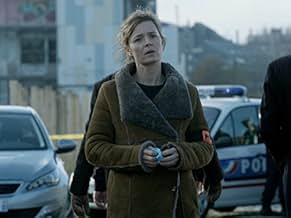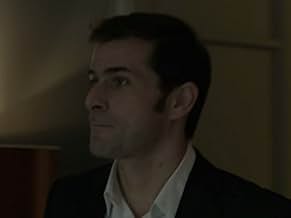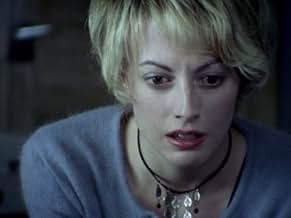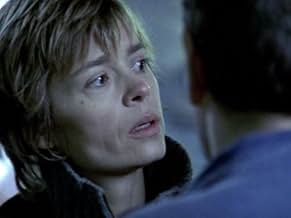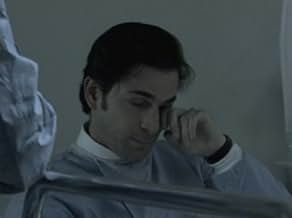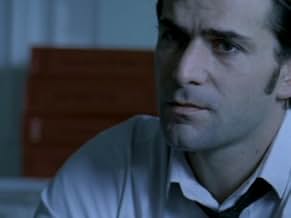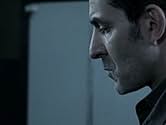Suit les enquêtes criminelles menées à Paris du point de vue de toutes les personnes impliquées.Suit les enquêtes criminelles menées à Paris du point de vue de toutes les personnes impliquées.Suit les enquêtes criminelles menées à Paris du point de vue de toutes les personnes impliquées.
- Nomination aux 1 BAFTA Award
- 3 victoires et 23 nominations au total
Parcourir les épisodes
Avis à la une
This is a review of Series 1 and Series 2 (total of 16 episodes) of the French police investigation TV series called 'Engrenages' in French but called 'Spiral' in English. ('Engrenages' does not actually mean 'spiral' but is not particularly translatable. It embodies a complex concept within a single word, referring to a vast web of interlocked and enmeshed gearings of events and personalities, which perfectly describes this incredibly complex and intriguing body of simultaneous and interrelated stories.) This is a sensationally compulsive and gripping series, full of well-rounded leading characters whose evolving personal tales are just as interesting as the crimes they are perpetually solving. As is usual with French crime films and series, they struggle against the octopus of French political corruption on a continual basis, as they cope with crime after crime and try to do their jobs against all the obstacles artificially created by powerful 'high-ups' and stony-faced bureaucrats. What is so remarkable about this series is the extraordinarily vivid and compelling characters which are created, and the magnificent acting. It is not really accurate to describe this as a 'police' investigation series, because under the French system, judges, magistrates, and prosecutors work side by side with the detectives on a daily and hourly basis, and this is what makes this series so fascinating. Major characters also include corrupt defence lawyers who are in the pockets of drug dealers and thugs. There is only one thing wrong with this series, and that is that someone high up in the production team (writer, director, or producer) is responsible for a disturbing and revolting streak of sadistic necrophilia which recurs time and again. We have to sit through numerous prolonged sequences where the camera lovingly dwells on mutilated or burnt corpses, which have clearly been expensively and meticulously produced by the props department. This is part of the contemporary trend of 'being tough on screen' by showing pathologists at work, a sickness indulged in also in British television at the present time, but really it is disgusting and whoever is responsible for including all that in this otherwise wonderful series should be taken to the nearest vivisection room and done away with. The main star of this series is the extraordinarily versatile and talented actress Caroline Proust. In the first couple of episodes she was a bit up tight as she settled into the role, but by the end of Series 2 she had so grown into it that she was spontaneity itself, and very endearing as she jumped up and down like a gleeful child when cleared in an internal investigation. As a detective captain, she epitomizes the dilemma of the modern woman, forced to do a man's job in dangerous circumstances and be as tough as a man, while coping with love pangs, loneliness, personal isolation and no lasting partner, dreaming of having kids but knowing there will be no chance, and frustrated at being the victim of continual gender bias and persecution by men who view themselves as alpha males. She is a delightful and sympathetic presence on the screen. The other woman dominant in the series is Audrey Fleurot, an eerily beautiful redhead covered in tiny freckles who epitomises the descent into evil. In episode after episode, we watch her progressively sell her soul to the devil as an increasingly corrupt advocate, betraying everything and everyone for money. Rarely has a reptile in human form been so successfully and compulsively portrayed. Really, Fleurot has achieved classic status as a villainess, and you simply cannot take your eyes off her because she is so wonderfully strange. My favourite character in the series is Judge Roban ('Monsieur Juge'), an investigating magistrate played by Philippe Duclos. He is quirky, eccentric, brilliant, intense, and a perfect joy to watch. The main investigating prosecutor ('Monsieur Procureur') is played by Gregory Fitoussi. He is a bit of a French 'pretty boy', ever such a good person, but also psychologically limited. Also compulsively watchable, exasperating and endearing at the same time, is the remarkable Thierry Godard, who plays the police detective Gilou. There are countless fascinating supporting characters, such as Guillaume Cramoisan, who plays Benoit Faye, the childhood friend of Fitoussi who is always getting mixed up in something dodgy and thinks all rules exist to be bent. Then there is the chilling psychopathic pervert who is personal assistant to a minister, Arnaud Laborde, played by Scali Delpeyrat, Daniel Duval who plays the ghastly and horrifying Me Szabo, Reda Kateb who plays the terrifying drug dealer Aziz, and the gallery of characters just goes on and on. Many of the Arabs and Berbers in the stories are amazingly good as actors. There is never a dull moment for hour after hour, the tension never slackens for an instant, and Series 3 must be impatiently awaited by hordes of viewers, amongst which I number myself as a dedicated enthusiast. This series is really an incredible achievement. The 'creators' are Alexandra Clert and Guy-Patrick Sainderichin; this is her first project, but he is a highly experienced French TV writer with a background also as an actor. They have been assisted by Virginie Brac and three other writers and there have been four directors, all splendidly creative. Everyone is excellent, and everything is superb except for all those horrible corpses. Interwoven throughout the series are highly intriguing miniature stories of puzzling crimes which are solved side by side with the main continuing investigations, in order to show the complexity of detective work, and how life is never dull for an instant. These are never just padding but are always interesting, and often bizarre. Everything about this series is highly charged, full of astounding energy and creativity, and it is really a triumph of sustained television drama. The amount and level of talent shown by everyone connected with this series is astonishing. The series really does deserve lots of awards.
I just watched my last ever episode of Engrenages. No more, supposedly, will be made. I've seen every single one over the years and watched the characters grow and change as well as the new ones introduced.
It's showing a harsh reality of the underside of glamorous Paris. Corruption, poverty, slavery, immigrant crime, drugs, murder and robbery. Having used the word "reality", one mustn't go overboard. The series requires a hefty dose of acceptance of the absurd to be able to believe in the plot. Cops, judges and lawyers don't act like this in the real world. Some of the coincidences are contrived. However, the excellence of the acting and the overarching plot lines mean that one simply forgets about the inconsistencies and exaggerations.
Everyone has to have their favourite characters in the series and mine was Judge Roban. I missed him in the final season, which I thoroughly enjoyed, and I don't think he would have put up with some of the shenanigans that the two new judges allowed.
Of course, without the character of Laure, there would be no series at all. It's hard to imagine another actress pulling this off throughout the seasons. And the disaster zone of Gilou simultaneously ruining and solving investigations.
The series could not have been about dry police procedure only and therefore opened out onto the private lives of the characters. Usually this is done in a cosmetic way to add some purported human interest, but here the personal meshed with the professional and drove the plots along in unforeseen ways.
The producers weren't afraid to kill popular major characters off either which was a definite plus. It added a frisson and new blood to the overall story. And neither were they frightened of losing sympathetic minor ones either that other series might have shied away from. These deaths weren't wasted as they were drivers of the plot and development itself.
All in all, a super series that kept the tension up for far longer than many others could have. So many are burnt out after two or three seasons but not Engrenages. I'm perfectly devastated that it's all come to an end.
It's showing a harsh reality of the underside of glamorous Paris. Corruption, poverty, slavery, immigrant crime, drugs, murder and robbery. Having used the word "reality", one mustn't go overboard. The series requires a hefty dose of acceptance of the absurd to be able to believe in the plot. Cops, judges and lawyers don't act like this in the real world. Some of the coincidences are contrived. However, the excellence of the acting and the overarching plot lines mean that one simply forgets about the inconsistencies and exaggerations.
Everyone has to have their favourite characters in the series and mine was Judge Roban. I missed him in the final season, which I thoroughly enjoyed, and I don't think he would have put up with some of the shenanigans that the two new judges allowed.
Of course, without the character of Laure, there would be no series at all. It's hard to imagine another actress pulling this off throughout the seasons. And the disaster zone of Gilou simultaneously ruining and solving investigations.
The series could not have been about dry police procedure only and therefore opened out onto the private lives of the characters. Usually this is done in a cosmetic way to add some purported human interest, but here the personal meshed with the professional and drove the plots along in unforeseen ways.
The producers weren't afraid to kill popular major characters off either which was a definite plus. It added a frisson and new blood to the overall story. And neither were they frightened of losing sympathetic minor ones either that other series might have shied away from. These deaths weren't wasted as they were drivers of the plot and development itself.
All in all, a super series that kept the tension up for far longer than many others could have. So many are burnt out after two or three seasons but not Engrenages. I'm perfectly devastated that it's all come to an end.
9wd-8
I've just binged the full 7 seasons, 76 episodes, 57 hours. And every hour, superb.
This highly complex police drama from France is incredibly good. The plots are complex and tightly written. The production values increase with every year, and camera work is very good by season 3.
I love that the police and judges are often flawed, and make sometimes terrible mistakes. In particular, the lead, Caroline Proust, takes incredible stress and presents it on screen wonderfully. I also love how the writers provide redemption for the characters when they are broken or in danger, often through unexpected twists.
There are often amazing twists in the season plots, and each year is constantly fresh and new-feeling. It's extremely rare to see any plot event or dialogue that doesn't ring true.
This is extraordinary television. It's no wonder it's moving now into it's eighth season.
Must see.
This highly complex police drama from France is incredibly good. The plots are complex and tightly written. The production values increase with every year, and camera work is very good by season 3.
I love that the police and judges are often flawed, and make sometimes terrible mistakes. In particular, the lead, Caroline Proust, takes incredible stress and presents it on screen wonderfully. I also love how the writers provide redemption for the characters when they are broken or in danger, often through unexpected twists.
There are often amazing twists in the season plots, and each year is constantly fresh and new-feeling. It's extremely rare to see any plot event or dialogue that doesn't ring true.
This is extraordinary television. It's no wonder it's moving now into it's eighth season.
Must see.
While the approach is not new, the execution is excellent.
Firstly the stories interweave and become more engrossing with their machinations, the "engrenages".
Secondly the pace is engaging so its impossible to foresee the next part, and that is because it's well written and intelligently for the viewer; not disguised by quick cuts to dazzle the eye but then frustrate by its tedium or obviousness.
Thirdly, the cast is right and well directed. Characters are alive with a range of human flaws. Maybe Albert Camus was the script editor overseeing the lines of each character's arc.
Unlike some police dramas this one doesn't pull its punches - quite literally - and for those of us all too bored with the US legal system, the presentation of the way the French one does its business, is another interesting aspect to the show.(Along with all the slang.) And finally, watching Caroline Proust and Audrey Fleurot (the former plays a strong brigade police captain; the latter plays a lawyer without morality) is the coup de grace.
Firstly the stories interweave and become more engrossing with their machinations, the "engrenages".
Secondly the pace is engaging so its impossible to foresee the next part, and that is because it's well written and intelligently for the viewer; not disguised by quick cuts to dazzle the eye but then frustrate by its tedium or obviousness.
Thirdly, the cast is right and well directed. Characters are alive with a range of human flaws. Maybe Albert Camus was the script editor overseeing the lines of each character's arc.
Unlike some police dramas this one doesn't pull its punches - quite literally - and for those of us all too bored with the US legal system, the presentation of the way the French one does its business, is another interesting aspect to the show.(Along with all the slang.) And finally, watching Caroline Proust and Audrey Fleurot (the former plays a strong brigade police captain; the latter plays a lawyer without morality) is the coup de grace.
Fast-paced, like NY in the 70's, dirty cops with hearts of gold, people you despise but grow to love, there are car chases, bombs, gangs, vice, serial killers, very little glamour, nothing fake (like US TV) - colleagues, family, friends, bereavement, retirement, freemasons, wrong steps, putting the wrong steps right. Oh la la - so much going on and it just keeps on going on, not one slow episode as far as I can remember. I just don't know what I'm going to do when it all ends in a couple of episodes. So sad to be no longer spending my evenings with Gilou, Laure and Josephine.
Le saviez-vous
- AnecdotesPhilippe Magnan & Grégory Fitoussi also worked together on Les hommes de l'ombre (2012) as Philippe Deleuvre & Ludovic Desmeuze respectively.
- ConnexionsFeatured in BAFTA Television Awards 2016 (2016)
Meilleurs choix
Connectez-vous pour évaluer et suivre la liste de favoris afin de recevoir des recommandations personnalisées
- How many seasons does Spiral have?Alimenté par Alexa
Détails
Contribuer à cette page
Suggérer une modification ou ajouter du contenu manquant


![Regarder Bande-annonce Saison 5 [OV]](https://m.media-amazon.com/images/M/MV5BMzYwY2UxNTQtMzk2My00NmMyLThkYTktODY2OTU4Y2Y0MDZhXkEyXkFqcGdeQXRodW1ibmFpbC1pbml0aWFsaXplcg@@._V1_QL75_UX500_CR0)

